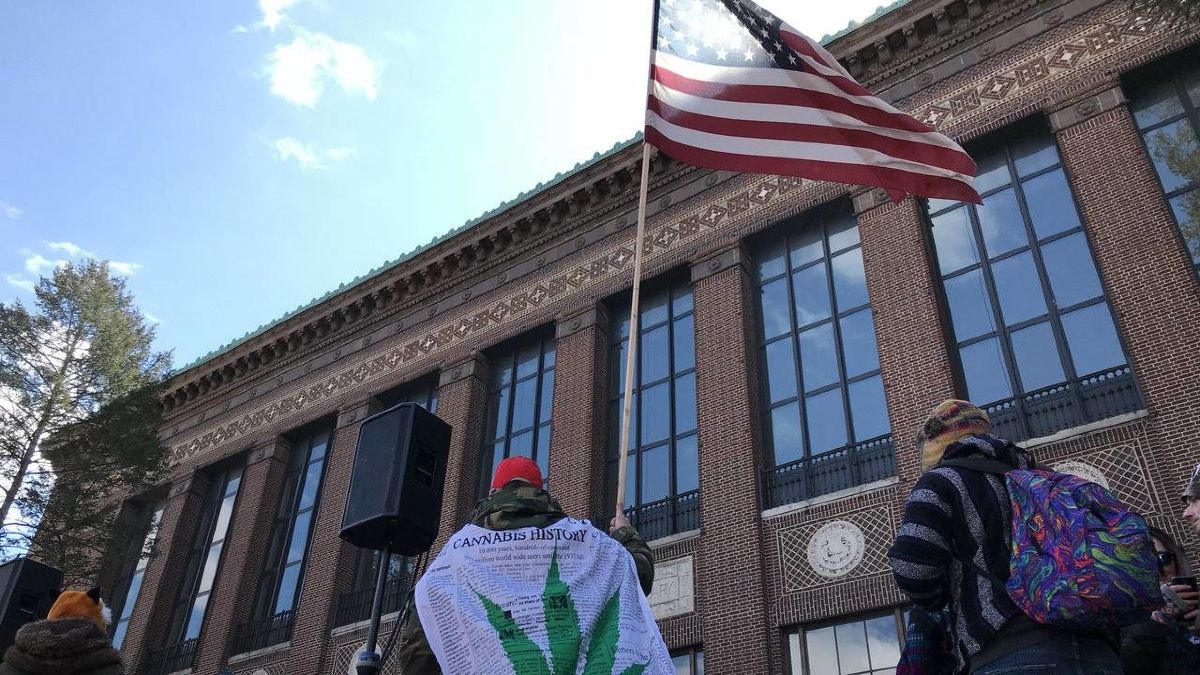Baron23
Well-Known Member
New Michigan marijuana licensing agency will make decisions behind closed doors
LANSING – When the Michigan Medical Marijuana Licensing Board meets Thursday morning to consider 128 business applications, it will be one of the last times there will be a public vetting of the people who want to grow, process, transport, test and sell weed in Michigan.
On April 30, a new state agency within the Department of Licensing and Regulatory Affairs — the Marijuana Regulatory Agency — is expected to take over licensing for both the medical and the recreational marijuana markets. Under Gov. Gretchen Whitmer’s executive order, the existing licensing board will no longer exist.
While the five-member, politically appointed licensing board, which was created in 2016 when the Legislature passed bills to regulate and tax medical marijuana, is required to meet in public to approve or deny marijuana business licenses, the new agency will make those decisions behind closed doors.
The new agency will be required to hold four public meetings a year to discuss the regulation of the marijuana industry, but any discussion of licensing decisions will come after those decisions have been made.
“We won’t necessarily have that public discussion of every application,” said Andrew Brisbo, director of the Bureau of Marijuana Regulation. “A lot of that review (of applications), as is done with every other regulatory program in the state, will happen in private by the analysts who actually review the applications.”
More: Gretchen Whitmer signs executive order to abolish Michigan marijuana licensing board
More: CBD regulation remains jumbled in the marijuana market nationwide
That will be a distinct departure from how the current licensing board operates, in which various aspects of many applicants’ lives — from their financial history to criminal background — has been dissected in detail by some board members.
The board has only two meetings scheduled before it is disbanded — Thursday and April 25. While the Legislature has the ability to veto Whitmer’s executive order abolishing the board before April 30, neither the House nor the Senate is expected to weigh in on the issue.
“I’ve got no problem with it. That’s where (licensing) should have been all along,” said Sen. Peter Lucido, R-Shelby Township, referring to LARA. “The board has had a hard time doing its job.”
But Craig Mauger, director of the Michigan Campaign Finance Network, which tracks campaign spending and government transparency issues, said regulating a burgeoning industry that is poised to make a considerable amount of money deserves a more open licensing process.
"The more information that the state can provide about who is applying for licenses, who is getting licenses and who isn’t, the better. And that’s not just the name of the business, but who is behind the applications and their financial interests," he said. "These are businesses that stand to make or lose large sums of money. Sunlight is the best disinfectant to make sure that nothing nefarious takes place."
The transition will come as the volunteer board has struggled to consider license applications in a timely manner, effectively stalling a fully viable medical marijuana market at a time when the much bigger recreational weed business is just around the corner.
Since the first medical marijuana dispensary began selling pot in November, there have been $46 million in sales and the recreational market is expected to far exceed that number.
Since beginning to consider applications for growers, processors, transporters, testing facilities and dispensaries in July, the board has approved 121 licenses. Of those, 105 businesses — 31 growers, 11 processors, 54 dispensaries, four testing labs and five transporters — have paid their state regulatory assessments and actually been awarded licenses and are operating.
Another 294 applicants have been given preliminary approval for a license and will come back for final authorization when the communities where they want to locate also have agreed to allow the businesses to operate. The board also has denied 166 applicants for either pre-qualifcation status or a license.
In her executive order, Whitmer said it will be much more efficient and timely to have one agency reviewing licenses for both medical and recreational marijuana.
The licensing board has come under fire for inconsistent decisions on medical marijuana licenses. Some applicants have been denied for minor brushes with the law that are decades old or even some where charges were dismissed. About 80 of those who have been denied are in line to appeal those decisions to an administrative law judge.
There is a possibility that those denials will be reviewed by the new state agency, Brisbo said.
“We’re aware of that situation and considering it behind the scenes to determine how we can do things when the (new agency) is in effect,” he said.
LARA is in the process of coming up with the rules and regulations for the legalized recreational market that was approved by voters in November. While the use and possession of weed is legal now for people 21 and older, it won’t be commercially available for sale until those rules are in place.
Brisbo said that several work groups, representing medical marijuana businesses and cardholders, consultants, lawyers and communities, will begin meeting next week to provide their input on the new rules with a draft set of regulations ready for review this summer. The new agency is expected to begin awarding licenses for recreational marijuana businesses early next year. For the first two years, current medical marijuana license holders will be first in line for recreational licenses.
LANSING – When the Michigan Medical Marijuana Licensing Board meets Thursday morning to consider 128 business applications, it will be one of the last times there will be a public vetting of the people who want to grow, process, transport, test and sell weed in Michigan.
On April 30, a new state agency within the Department of Licensing and Regulatory Affairs — the Marijuana Regulatory Agency — is expected to take over licensing for both the medical and the recreational marijuana markets. Under Gov. Gretchen Whitmer’s executive order, the existing licensing board will no longer exist.
While the five-member, politically appointed licensing board, which was created in 2016 when the Legislature passed bills to regulate and tax medical marijuana, is required to meet in public to approve or deny marijuana business licenses, the new agency will make those decisions behind closed doors.
The new agency will be required to hold four public meetings a year to discuss the regulation of the marijuana industry, but any discussion of licensing decisions will come after those decisions have been made.
“We won’t necessarily have that public discussion of every application,” said Andrew Brisbo, director of the Bureau of Marijuana Regulation. “A lot of that review (of applications), as is done with every other regulatory program in the state, will happen in private by the analysts who actually review the applications.”
More: Gretchen Whitmer signs executive order to abolish Michigan marijuana licensing board
More: CBD regulation remains jumbled in the marijuana market nationwide
That will be a distinct departure from how the current licensing board operates, in which various aspects of many applicants’ lives — from their financial history to criminal background — has been dissected in detail by some board members.
The board has only two meetings scheduled before it is disbanded — Thursday and April 25. While the Legislature has the ability to veto Whitmer’s executive order abolishing the board before April 30, neither the House nor the Senate is expected to weigh in on the issue.
“I’ve got no problem with it. That’s where (licensing) should have been all along,” said Sen. Peter Lucido, R-Shelby Township, referring to LARA. “The board has had a hard time doing its job.”
But Craig Mauger, director of the Michigan Campaign Finance Network, which tracks campaign spending and government transparency issues, said regulating a burgeoning industry that is poised to make a considerable amount of money deserves a more open licensing process.
"The more information that the state can provide about who is applying for licenses, who is getting licenses and who isn’t, the better. And that’s not just the name of the business, but who is behind the applications and their financial interests," he said. "These are businesses that stand to make or lose large sums of money. Sunlight is the best disinfectant to make sure that nothing nefarious takes place."
The transition will come as the volunteer board has struggled to consider license applications in a timely manner, effectively stalling a fully viable medical marijuana market at a time when the much bigger recreational weed business is just around the corner.
Since the first medical marijuana dispensary began selling pot in November, there have been $46 million in sales and the recreational market is expected to far exceed that number.
Since beginning to consider applications for growers, processors, transporters, testing facilities and dispensaries in July, the board has approved 121 licenses. Of those, 105 businesses — 31 growers, 11 processors, 54 dispensaries, four testing labs and five transporters — have paid their state regulatory assessments and actually been awarded licenses and are operating.
Another 294 applicants have been given preliminary approval for a license and will come back for final authorization when the communities where they want to locate also have agreed to allow the businesses to operate. The board also has denied 166 applicants for either pre-qualifcation status or a license.
In her executive order, Whitmer said it will be much more efficient and timely to have one agency reviewing licenses for both medical and recreational marijuana.
The licensing board has come under fire for inconsistent decisions on medical marijuana licenses. Some applicants have been denied for minor brushes with the law that are decades old or even some where charges were dismissed. About 80 of those who have been denied are in line to appeal those decisions to an administrative law judge.
There is a possibility that those denials will be reviewed by the new state agency, Brisbo said.
“We’re aware of that situation and considering it behind the scenes to determine how we can do things when the (new agency) is in effect,” he said.
LARA is in the process of coming up with the rules and regulations for the legalized recreational market that was approved by voters in November. While the use and possession of weed is legal now for people 21 and older, it won’t be commercially available for sale until those rules are in place.
Brisbo said that several work groups, representing medical marijuana businesses and cardholders, consultants, lawyers and communities, will begin meeting next week to provide their input on the new rules with a draft set of regulations ready for review this summer. The new agency is expected to begin awarding licenses for recreational marijuana businesses early next year. For the first two years, current medical marijuana license holders will be first in line for recreational licenses.




